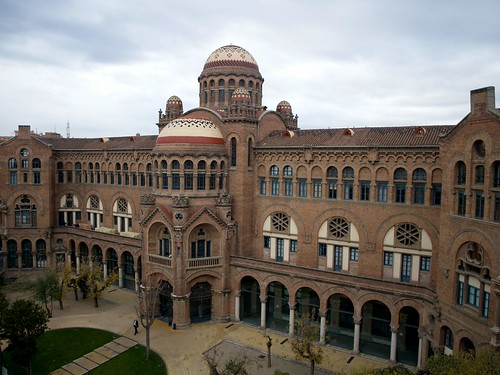I have no idea with what "trobada" means, and apparently it is not a spanish word. Yes, it is from Catalan and it means "conference"..... So Barcelona GSE "Trobada" VIII is the annual conference for GSE afflicted professors.
This year it is held in a very beautiful and historical building, Casa Convalescència. Oh, I admit I should have brought my camera there. What a pity! I can only download some pictures from the Internet and paste them here.
Today's topics were very interesting. I listened to three presentations.
Prof. Giacomo Ponzetto (CREI-UPF and Barcelona GSE)
"Politics, Asymmetric Information, and Protectionism"Prof. Johannes Gierlinger (UAB and Barcelona GSE)
"Hedging Priors: On Novel Instruments to Insure against Ambiguity"Prof. Davide Cantoni (UPF and Barcelona GSE)
"Natural Experiments in Economic History"
I was there because the last one, natural experiments in economic history, attracted me. It was a very brilliant idea to "design" natural experiment in economic history. Well, one interesting thing is that nearly all people admit that we need to learn economic history, but this course is still not available here (sorry, it is available. I made a mistake), and not many students will actually registered for it, perhaps due to the way it is taught and the form of exam.
Another thing I was considering for the whole morning was that what's the difference between the questions European economists care about and those from U.S. or China. In China we don't need to think about "lobby", since the political system is so different. If institution plays an important role in determining the economic growth speed and pattern, what can we conclude from China's example? Is the potential lobby power (like the pressure from big companies) growing and influencing policy makers? Will they still consider the global situation and make a wise choice?
A big problem for China now may be the exchange rate. G20 Conference is holding, and everyone is predicting the trend of future's world economy. I have heard that whenever the Chinese department of commerce is going to make a new economic policy, they will face different pressure from all related industries. Therefore, can they still stay balanced and choose the best strategy for the whole economy? It is definitely hard, and we cannot forecast the result. Economic models cannot tell everything in the real world. We can learn from economic theories, or the real history.
[Update 2010.10.24]
1. Thanks for Jodi's email, and now I update the new pictures. For more, see http://www.flickr.com/photos/barcelonagse/sets/72157625216250106/
2. I emailed Prof. Davide Cantoni and got the list of papers he mentioned on the conference (He is really a nice guy, and I do want to take his economic history course now). I'd like to paste the list here, and so, enjoy~~~
Acemoglu, Johnson, Robinson, "Colonial Origins of Comparative Development" (http://ideas.repec.org/a/aea/aecrev/v91y2001i5p1369-1401.html)
Jeremiah Dittmar, "Information Technology and Economic Change: The Impact of the Printing Press" (http://www.jeremiahdittmar.com/research)
James Feyrer and Bruce Sacerdote, "Colonialism and Modern Income: Islands as Natural Experiments" (http://ideas.repec.org/a/tpr/restat/v91y2009i2p245-262.html
)Elise Huillery, "History Matters: The Long Term Impact of Colonial Public Investments in French West Africa" (http://econ.sciences-po.fr/elise-huillery/papers)
Melissa Dell "The Persistent Effects of Peru's Mining Mita" (http://econ-www.mit.edu/grad/mdell/papers)
A paper that gives a good review on this strand of research more generally is Nathan Nunn's contribution to the "Annual Review":
http://www.economics.harvard.edu/faculty/nunn/files/Nunn_ARE_2009.pdf




